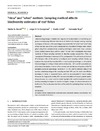Identificador persistente para citar o vincular este elemento:
https://accedacris.ulpgc.es/jspui/handle/10553/49557
| Título: | "How" and "what" matters: Sampling method affects biodiversity estimates of reef fishes | Autores/as: | Bosch Guerra, Néstor Echedey Gonçalves, Jorge M. S. Erzini, Karim Tuya, Fernando |
Clasificación UNESCO: | 3308 Ingeniería y tecnología del medio ambiente 241705 Biología marina |
Palabras clave: | Asymptotic richness Baited remote underwater video Biodiversity patterns Cost-efficiency Fish traps, et al. |
Fecha de publicación: | 2017 | Publicación seriada: | Ecology and Evolution | Resumen: | Understanding changes in biodiversity requires the implementation of monitoring programs encompassing different dimensions of biodiversity through varying sampling techniques. In this work, fish assemblages associated with the "outer" and "inner" sides of four marinas, two at the Canary Islands and two at southern Portugal, were investigated using three complementary sampling techniques: underwater visual censuses (UVCs), baited cameras (BCs), and fish traps (FTs). We firstly investigated the complementarity of these sampling methods to describe species composition. Then, we investigated differences in taxonomic (TD), phylogenetic (PD) and functional diversity (FD) between sides of the marinas according to each sampling method. Finally, we explored the applicability/reproducibility of each sampling technique to characterize fish assemblages according to these metrics of diversity. UVCs and BCs provided complementary information, in terms of the number and abundances of species, while FTs sampled a particular assemblage. Patterns of TD, PD, and FD between sides of the marinas varied depending on the sampling method. UVC was the most cost-efficient technique, in terms of personnel hours, and it is recommended for local studies. However, for large-scale studies, BCs are recommended, as it covers greater spatio-temporal scales by a lower cost. Our study highlights the need to implement complementary sampling techniques to monitor ecological change, at various dimensions of biodiversity. The results presented here will be useful for optimizing future monitoring programs. | URI: | https://accedacris.ulpgc.es/handle/10553/35698 | ISSN: | 2045-7758 | DOI: | 10.1002/ece3.2979 | Fuente: | Ecology and Evolution [ISSN 2045-7758], v. 7 (13), p. 4891-4906, (2017) |
| Colección: | Artículos |
Citas SCOPUSTM
36
actualizado el 08-jun-2025
Citas de WEB OF SCIENCETM
Citations
34
actualizado el 08-jun-2025
Visitas
107
actualizado el 30-nov-2024
Descargas
52
actualizado el 30-nov-2024
Google ScholarTM
Verifica
Altmetric
Comparte
Exporta metadatos
Los elementos en ULPGC accedaCRIS están protegidos por derechos de autor con todos los derechos reservados, a menos que se indique lo contrario.
